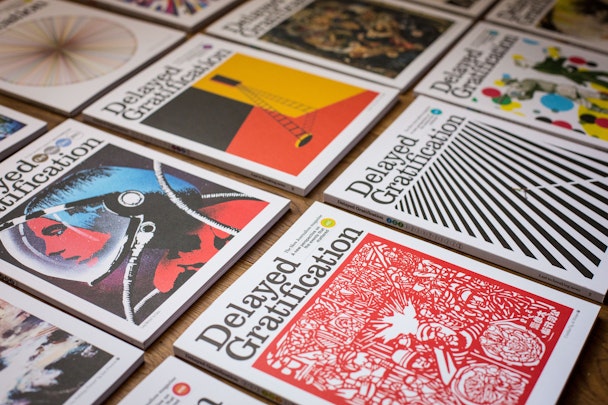The ups and downs of printing indie magazine Delayed Gratification in lockdown
With both legacy and new media titles strained, we discover how indie magazine Delayed Gratification has been adapting to changed circumstances under lockdown.

Delayed Gratification has, like many other indie titles, been boosted and hit by the coronavirus lockdown. / Delayed Gratification
With the collapse of advertising and marketing spend in recent months, media titles and especially magazine publishers have had a rough time of it, with lay-offs and pay cuts reported across the sector. Just this week, Dennis Publishing, the owner of brands such as Viz and The Week, announced that it was putting a quarter of its staff into a redundancy consultation.
However, for some publishers, a significant increase in magazine subscriptions has offset market woes. A study from Jellyfish found that demand for magazine subs has skyrocketed under lockdown, with verticals such as tech and gaming seeing a 268% year-on-year increase.
With less reliance on physical office space and smaller staffs, independent magazines have found themselves better positioned to cater to that increase in subscription demand.
Delayed Gratification is a quarterly indie title that champions ‘slow journalism’, covering current affairs with a three-month lag. Founded in 2010 with the tag ’Last to breaking news’, it’s considered a darling of the indie scene for its infographics and longform reporting.
According to co-founder and editorial director Rob Orchard, it's also seen record-breaking subscription sales during the lockdown period.
“We’ve seen subscription sales that at times look more like Christmas sales,” he says. “We’ve seen a major rise in subscriptions, which has been the silver lining for us. We’ve had record-breaking sales, at times double what we would expect for this time of year.”
However, distribution networks and the newsstand have been significantly impaired.
According to Orchard, Delayed Gratification’s latest issue, which covered the final quarter of 2019, was sent to the United States the day before the country locked down incoming air mail deliveries. While US subscribers got their copies on time, thousands meant for the newsstand have been held up at distribution houses, as the bookshops and magazine stores that stock the magazine closed their doors.
“They’ve just been sitting there in warehouses. That’s tens of thousands of pounds worth of stock that is usable, but only if we sell insane numbers of back issues over the next 20 years.”
Digital edition
Distribution headaches, and the fear that the title’s printers would cease operations, led to the magazine unveiling its first-ever digital edition. ”People have asked us for years for a digital version of the magazine... but we've always shied away from it because we didn't think that it was as special,” says Orchard. Since launching “with zero fanfare”, the title has gained its first seven digital-only subscribers. Orchard says the title will build on that base going forward to capture those readers uninterested in printed matter or in territories that make shipping prohibitive.
“That prospect of not being able to print the magazine gave us a real kick up the bottom to get that sorted,” he adds.
The magazine has also taken its events business virtual, albeit reluctantly. “We’ve always said it won’t be the same. You wouldn't have that kind of intimacy that you get from being in the same room as other people.
“If anything, it's kind of been better and more intimate, in a weird way. We’ve had smaller groups of readers, but from all over the world. It’s amazing – you’re talking to somebody in Brazil, and somebody who’s in Las Vegas, and somebody who’s in Dublin, all on the same call in a way that would never be possible before.”
Changing reader habits
To cope with changed circumstances in the streets, the title plans to clip back the print run – usually around 10,000 copies – of its next issue, due out later this month. “We’ll be bringing it down significantly,” Orchard explains. And while high streets and newsstands are beginning to re-open, he suggests consumer habits will not return to normal as quickly, if at all.
“Independent magazines cost quite a lot – it’s much less of an impulse purchase. And if people are not going to be browsing in the same way, then I think there’s every chance that sales of indie mags will be much, much lower.”
“It may just be that all people want to do is go to the pub and just drink solidly, as much as they possibly can,” he suggests.
On the other hand, recent events could spur the adoption of new habit-forming behaviours for magazine readers. “More people are going to need things that make them feel part of something. I think there is going to be real engagement with the world and a desire to know about it.
“People need to know what's going on, more than ever before.”
The Drum later interviewed magazine giants. Check out their ups and downs here.

